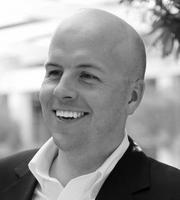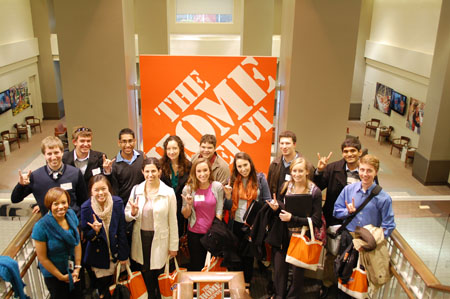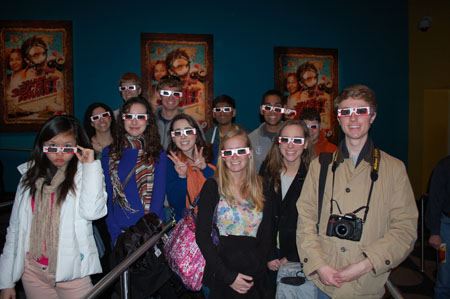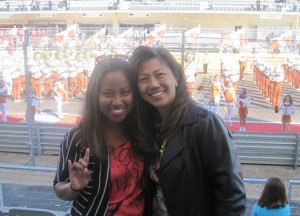Originally published on McCombs TODAY
 Webb Stevens, BBA ’04, enjoys navigating leadership positions as much as he enjoys navigating mountain-climbing excursion and water safaris. Since graduating from the Business Honors Program, he has travelled the world as a strategy and operations consultant with Deloitte and now, as senior director of business and corporate development at Avalara, a sales-tax automating software provider, he is helping companies across the country simplify their tax processes. But throughout his career, he hasn’t forgotten where his success started—at McCombs.
Webb Stevens, BBA ’04, enjoys navigating leadership positions as much as he enjoys navigating mountain-climbing excursion and water safaris. Since graduating from the Business Honors Program, he has travelled the world as a strategy and operations consultant with Deloitte and now, as senior director of business and corporate development at Avalara, a sales-tax automating software provider, he is helping companies across the country simplify their tax processes. But throughout his career, he hasn’t forgotten where his success started—at McCombs.
In a phone call from his office in Seattle, Stevens discussed his experience in the business world and how he remains connected with the University of Texas at Austin and the McCombs School of Business. Here is our conversation, edited for clarity and length.
What have you done since graduation?
Since I left McCombs I’ve been having a good time! I did a stint with Deloitte in the strategy and operations group and then moved to venture capital and private equity with Summit Partners, and joined the company I actually tried to make an investment in, Avalara.
Where in the world has your career taken you so far?
For Deloitte I basically lived on an airplane. I worked for a month in Istanbul, and I worked for six months out of the UK. I enjoyed the traveling, but at a certain stage in your life it’s a lot easier to do.
What did you learn from all the traveling?
I think that a lot of the trite phrases about having to work with other cultures, while trite when being said in a classroom, are still true. You’re really getting to work with people that have a different perspective, not just because they’re in marketing or sales or development, but because of their culture have a radically different way of solving problems or approaching business issues. The other important issue that’s absolutely applicable in my role right now is massively different regulating environments. Thinking about those things early on is always valuable.
How else have you stayed connected to McCombs?
I was fortunate to be fairly lucky and have some success with case competitions as an undergrad. And I think as a result of that I was invited back to judge the competitions and Kurt Leedy, BBA ’02, and I wrote the case for a local [competition]. I got involved in that as a product of winning some [case competitions] as an undergrad.
How did those case competitions shape your experience at McCombs?
As a student, part of the reason why I found it rewarding to do extracurricular activities like case competitions was because it really puts together all the pieces of the business education when you have to apply accounting, finance, marketing and presentation skills all in a couple of days. I think it was that more than anything else that drove me towards pursuing strategy and operations consulting. When I’d had some success at some of those competitions and was thinking about what I wanted to do after McCombs, somebody mentioned that there was an equivalent to case competitions professionally, and it was called management consulting. So for the lack of being more creative while thinking about what I wanted to do next, I thought that sounded interesting and decided to pursue the strategy and operations consulting role.
As an alumnus, what has your experience been with the McCombs alumni network?
The McCombs alumni network is an impressive one. There were multiple times when I was in Leeds [England] I would go and meet with fellow McCombs alumni in London that were there working permanently with a variety of different jobs. The McCombs reach is broad.
When I moved to California, I was looking to build a professional and social network and started attending some of the McCombs events. I then joined the executive team, organizing a couple of events throughout the year. And then the former president stepped down and so I filled in, not really aggressively seeking it out but because there was a need and I wanted to make sure that we could keep organizing projects and events for McCombs alumni in the Bay Area.
Why do you think the McCombs network is so strong?
I think the business world definitely encourages a certain degree of professional networking, but I think everybody has such amazing experiences both academically and socially at McCombs. Whether it’s a BBA, MBA, or MPA program, there’s a common bond everyone has spending a handful of years on campus and in Austin that makes you a little more excited to reach out and interact with someone else that also had that shared experience.
What aspect of your career are you most proud of so far?
I think I’m probably most proud of the work I’m doing now. I’m co-managing two different teams of a total of 10 people in a rapidly growing company in the software [industry] that is having a really big impact on all the burden of taxes. It seems like a really mundane thing, but we’re positively impacting thousands of companies, allowing them to focus on what’s important.
When you aren’t working, what do you do?
I am trying to find time to get into the mountains and outdoors, participating in ultra endurance events. I was still able to find time when I was working at Summit in investing to train and complete a couple of ultra marathons. I took third place in a 50km race in 2010. I also completed a Texas Water Safari, which is a 263 nonstop canoe race in 2006 as a solo competitor. While I haven’t competed in anything specific here [in Seattle], I have actually paddled around Bainbridge Island, which is about 28 miles in a day, so I’m still getting out and doing some fun stuff.
Can you explain how you’ve used your love of the outdoors to help the community?
Since I’ve left McCombs, one of the things that I still put on my resume is Big City Mountaineers. I gave a presentation to one of the Business Honors Program symposiums when I was still in school about the value of outdoor education and the applicability it has in business and to life skills in general. I’ve continued to try to make contributions to people that are less fortunate. I’ve raised well over $10,000 for Big City Mountaineers, which takes at-risk urban youth and pulls them out of the city environment and puts them into constructive educational and learning environments out on a trail or canoeing trip. I’m proud that I’ve been able to find time with my professional career to go and raise funds for something that I think is a really worthwhile cause.
What advice do you have for current students?
Stay hungry. I think it’s really easy for people once they get a job to start to feel like they’ve got some stability, and, as a result, they start to get soft, frankly. If you put yourself in situations that are a stretch and actively pursue those, you not only experience professional success, but you’ll stay mentally sharp and have a lot of interesting life experiences.






